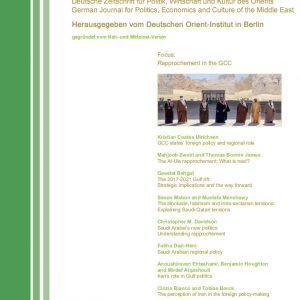Description
Despite blockading fellow Gulf state Qatar for nearly three and a half years, primarily on the basis of its links to organisations of political Islam, the willingness of Saudi Arabia to end the dispute in January 2021 was not entirely unexpected. After all, together with its “Anti-Terror Quartet” allies – the UAE, Bahrain and Egypt – little progress had been made on bringing Qatar to heel, with none of the original thirteen “demands” of July 2017 having ever been met. Moreover, with then US president-elect Joe Biden preparing to take office, and with a number of senior White House appointees known to be highly critical of Saudi Arabia’s crown prince and de facto ruler Mohammed bin Salman Al Saud (a.k.a. “MBS”), the annual GCC summit undoubtedly presented Riyadh with a timely opportunity to present itself as a more cooperative US security partner. Beyond such policy prospects, however, the apparent speed and smoothness of MBS’ Qatar U-turn has also helped underscore the fundamentally non-ideological nature of his emerging, more autocratic-authoritarian regime. As this article will demonstrate, MBS’ new Saudi politics strongly indicate that he and his inner circle have little time for the dominant ideologies of the region, including political Islam. Indeed, compared to earlier Saudi administrations with more complex approaches to Islamist organisations, MBS’ decisions seem to have been driven primarily by more realist, counter-ideological rationales. At the time he became crown prince in June 2017, he undoubtedly still saw potentially popular, post-Arab Spring Islamism as the greatest threat to his nascent rule, and unsurprisingly began to take a much harder line on domestic Islamist elements than any of his predecessors. More recently, however, with much of the immediate danger having seemingly subsided, he has not only softened his stance on Qatar but appears to have entered into strategic compromises with a number of Islamist groups and actors elsewhere in the region.
Christopher M. Davidson is a former reader in Middle East politics at Durham University in the UK and a former assistant professor at Zayed University in the UAE. His books on the comparative politics of the Gulf states include From Sheikhs to Sultanism: Statecraft and Authority in Saudi Arabia and the UAE (New York: Oxford University Press, 2021), After the Sheikhs: The Coming Collapse of the Gulf Monarchies (New York: Oxford University Press, 2013); and Dubai: The Vulnerability of Success (New York: Columbia University Press, 2008).




Reviews
There are no reviews yet.